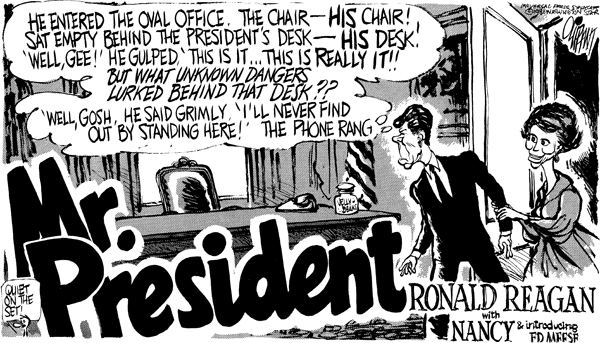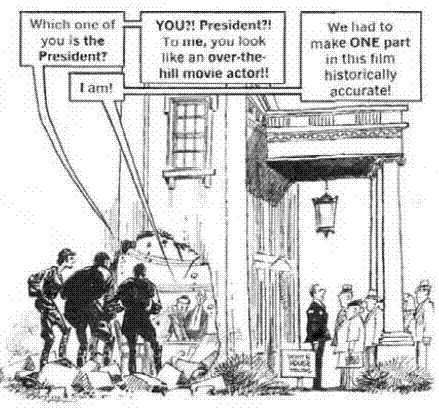
This year’s centenary of Ronald Reagan has been a source
of dissatisfaction to me. Most analyses or commentaries seem to miss
the point, and the rest are still somehow off. That’s persisted for
years.
1 My previous attempts to assess him and his times,
works, and legacy are especially insufficient.
2 This issue
is a new attempt to address some aspects of Reagan I think have been underexamined.
Reagan as Family Choice
The 1980 presidential election was the first I followed. Reagan
was the overwhelming choice among the adults on both sides of the
family. Reagan was one of the few politicians the family’s ever esteemed
and the only one to garner such broad support.
3
In retrospect, Reagan took positions on the issues of the
day that jibbed with my family’s, socially conservative and essentially
libertarianistic in outlook, and articulated those positions better
than my relatives, all of whom could express themselves quite well.
4
They also liked that Reagan was good with a quip.
5 My
relatives grumbled about the state of a union beset by stagflation,
social decay, and international weakness, created by the
corporatist warfare-welfare, managerial-therapeutic
state, and presided over by “that damned Carter,” as my paternal grandfather
called him with amused disdain during a large family gathering in
the
axial summer of 1980.
6
This developing familial consensus contradicted what I’d been gleaning
all year from the media, school, and the general gestalt in my social
democratic-leaning town in a social democratic-leaning state, at least
among the “right-thinking” sort.
7 And yet everywhere I went,
in town or elsewhere, I saw a profusion of Reagan bumper stickers and
lawn signs.
8 My family eschewed the campaign paraphernalia,
weren’t the type to be animated about politics, but they also clearly weren’t
among the “right-thinking” sort, in a gleefully defiant manner. A family
anecdote goes that an in-law to-be on Mom’s side of the family met the
Baltimore relatives and remarked, “I never
met so many Archie Bunkers in my life.”
9




 This year’s centenary of Ronald Reagan has been a source
of dissatisfaction to me. Most analyses or commentaries seem to miss
the point, and the rest are still somehow off. That’s persisted for
years.1 My previous attempts to assess him and his times,
works, and legacy are especially insufficient.2 This issue
is a new attempt to address some aspects of Reagan I think have been underexamined.
This year’s centenary of Ronald Reagan has been a source
of dissatisfaction to me. Most analyses or commentaries seem to miss
the point, and the rest are still somehow off. That’s persisted for
years.1 My previous attempts to assess him and his times,
works, and legacy are especially insufficient.2 This issue
is a new attempt to address some aspects of Reagan I think have been underexamined.
 From Election Day 1980 through summer 1981 Reagan smacked
the proponents, minions and beneficiaries of the corporatist state worse
than Angie Dickinson in “The Killers.”12 The sting has lasted
to this day and they’ve never forgiven him for it.13 The way
they go on, you’d think they were seized in the night by some death squad,
shot and left in a ditch somewhere. But the way they describe the era
is not the way it happened. In reality, they were put on the defensive,
forced by failure and defeat to justify their views and themselves to us,
and forced to come up with new ideas.14
From Election Day 1980 through summer 1981 Reagan smacked
the proponents, minions and beneficiaries of the corporatist state worse
than Angie Dickinson in “The Killers.”12 The sting has lasted
to this day and they’ve never forgiven him for it.13 The way
they go on, you’d think they were seized in the night by some death squad,
shot and left in a ditch somewhere. But the way they describe the era
is not the way it happened. In reality, they were put on the defensive,
forced by failure and defeat to justify their views and themselves to us,
and forced to come up with new ideas.14  The inability to zing Reagan wasn’t restricted to politics.
Some of the best comedy purveyors, e.g., Mad magazine and “Saturday Night
Live,” had also lost touch with the Zeitgeist in the early ‘80s.25
On this issue, Stephen Paul Miller wrote “If Reagan was a much less
memorable target than Gerald Ford, it should be remembered that at times
Reagan seemed more cutting-edge than ‘Saturday Night Live.’ ”26
The inability to zing Reagan wasn’t restricted to politics.
Some of the best comedy purveyors, e.g., Mad magazine and “Saturday Night
Live,” had also lost touch with the Zeitgeist in the early ‘80s.25
On this issue, Stephen Paul Miller wrote “If Reagan was a much less
memorable target than Gerald Ford, it should be remembered that at times
Reagan seemed more cutting-edge than ‘Saturday Night Live.’ ”26